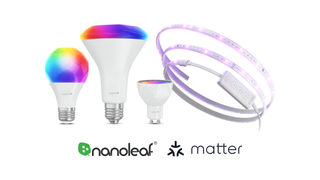Matter will finally make my smart home dreams come true – here’s how
Why the smart home of the future is one step closer thanks to Matter

Right now, I’m living in a rented apartment, but I’ve got lofty dreams of home ownership one day (and, given market conditions, those are very lofty.)
There are many benefits to this - namely, that I want a dog - but a pretty close second is having the freedom to do what I want with my space. It’s been an aspiration of mine for a while now to have my very own smart home with the full gamut of devices. I’m talking blinds, smart lighting, robot vacuums, smart locks - the full shebang.
Even if I managed to buy a property tomorrow, there would be a few reasons why I’d think twice about diving straight into smart home devices - but almost all of these are eradicated by the arrival of Matter 1.0, the new software standard from the Connectivity Standards Alliance (CSA) which promises a smarter future for homes.
I attended the CSA’s Matter launch event last week in Amsterdam, and spoke with some of the biggest names in the smart home industry, as well as the President and CEO of the CSA, Tobin Richardson. Here are some of my biggest concerns about the smart home world and how I became convinced that my dreams are set to come true.
1. Interoperability

The word on everyones lips at the event, and indeed in the run-up, was interoperability. Matter’s arrival is revolutionary for interoperability, which in laymans terms means making smart home devices work across different products and systems, so that your smart speaker can speak to your smart lights and your security camera to your smart lock and so on.
It’s the beating heart of Matter, and as Richardson explained, “What Matter does is it removes the complexity for the consumer. It takes away the burden or the hurdle that consumers may have as they think about getting devices to take on basic, simple tasks.”
This, for me, is the greatest boon. I love tech - it’s my job, after all - but I hate friction in technology. If I’ve invested in something, I expect to be able to pick it up and see the magic happen with minimal fuss. Until now, as Richardson says, consumers almost play the role of network administrators in their smart homes. Matter removes the need for this.
Get daily insight, inspiration and deals in your inbox
Get the hottest deals available in your inbox plus news, reviews, opinion, analysis and more from the TechRadar team.
Or, in Richardson's words, “If you put in interoperability, like really good interoperability, things just work, and that's the biggest benefit of Matter.”
Philippe Delplancke, Managing Director EMEA at Nanoleaf, has personal experience of this particular smart home frustration: “Even if I take my own experience, my wife is on iOS, and I’m on Android. When we have to decide on a smart voice assistant or product, we have to think of who is going to be able to use it.”
Matter is, of course, in its infancy, and interoperability is the crucial first step the standard is taking to propel smart homes forwards. As Delplancke says of his own smart home woes, “Not tomorrow, but in the coming weeks and months, [this concern] will be outdated.”
2. Security and privacy
I’ll take off my tin foil hat as much as possible here, but I'll be honest: I'm a little nervous when it comes to security and privacy, and especially regarding smart home devices. After all, these devices have advanced knowledge of the most intimate elements of our lives; when we come and go, when we sleep, the layout of our homes and even what we talk about when we’re in the presumed safety of our homes.
Standardisation through the CSA and Matter presents a great benefit for nervous consumers in this area, and while Richardson says this is an “ongoing process,” there’s reason to be hopeful. Previously, bad actors could easily access Wi-Fi-based smart homes simply by using the branding of trusted suppliers such as Apple, but with Matter-based homes, this will no longer be possible; they simply won’t be able to connect to the system. As Richardson explains, “Instead of having that [device] shipping information off to a server somewhere, it never gets on the network.”
A key benefit of Matter is how it’s driving control system providers to drop the cloud - which is great for privacy-conscious consumers. Dan Turk, PR representative for Eve, says the company knows a thing or two about local networks; keeping their devices out of the cloud has been fundamental to Eve products for half a decade.
“We don't operate with cloud, everything is local; device to device. All the information that's being captured by your smart home devices in your houses, wherever you are, is all staying locally. It's not being shipped out there to a cloud and then being rerouted somewhere else like with a lot of other brands - they sell that information.”
Matter, however, provides for local control from the get-go. Smart home enthusiasts will know this is how Apple HomeKit has always run the show, which Turk credits as the main reason why Eve has been exclusive to Apple for so long. Now, the likes of Google, Amazon and Samsung's SmartThings will be following suit.
For now, it seems there’s still progress to be made in the wider smart home market, but Richardson does shed light on how the CSA could do more in the future, stating that, “We're actually looking at coming up with different standards on privacy,” and adding that “we have different kinds of dedicated teams that are looking at this.”
Still, it’s important to note how far away we may be from seeing the fruits of these discussions. “We probably won't see the name for a few months because we're just doing the formulation phase; do we want to tackle this together? Is this the right place to do that? Are there more than five companies interested? Otherwise it's just a cottage project.”
3. Innovation

When I first looked at Matter and the wider CSA as a concept, I was a bit judgemental. To me, it was a case of mainly pre-established companies coming together in a way that would stifle innovation, keeping the market contained to the current players.
This spelled a grim future for my dream smart home. The current market is exciting, yes, but it can be a little… gray. There’s so much room for creativity still in terms of concept and design as the market grows and the opportunity for diversification becomes greater.
However, it appears that I was very much mistaken. Richardson acknowledged that, while it’s definitely the biggest challenge, promoting innovation has been a key consideration for his team. To support new entrants and ideas, the CSA has released its own software development kit, and made the decision to have Matter be internet protocol-based, meaning it’s about as accessible as it can be. It also publishes everything online – even for non-members – meaning anyone can play with the code and build with it.
The membership approach to the CSA currently is fee-based, but Richardson hints that this could change: “We're looking at different ways that we might update that to push more of the cost of participants further toward the point of product launch, so that people can play and tinker around with it.”
Outside of new entrants, opportunity for innovation is also opened up for some of the companies already in the CSA.
Delplancke said that, for Nanoleaf, interoperability opens up space for research and development (R&D): “For us as a company it means less R&D in terms of interoperability. Before, our new team had to work to make our product compatible with Apple HomeKit, Google Assistant, Amazon Alexa, each one of them, and it was a lot of work. Thanks to Matter this R&D time will be reduced, so we can use it to develop cool features, and to focus on the stuff that will benefit our users.”
Florian Deleuil, Marketing & Product Director at Netatmo, echoes this, explaining that, “The question for a startup like Netatmo is 'If there is a standard, how can you differentiate for your competition?' So today, we will be focused on innovation, not on just basic local communication.”
With the arrival of Matter, I'm that much closer to my dream of a smart home that keeps me safe, physically and digitally, while working seamlessly and allowing me to self express. Now I just need to win the lottery so I have somewhere to make it reality.

Josephine Watson (@JosieWatson) is TechRadar's Managing Editor - Lifestyle. Josephine has previously written on a variety of topics, from pop culture to gaming and even the energy industry, joining TechRadar to support general site management. She is a smart home nerd, as well as an advocate for internet safety and education, and has also made a point of using her position to fight for progression in the treatment of diversity and inclusion, mental health, and neurodiversity in corporate settings. Generally, you'll find her watching Disney movies, playing on her Switch, or showing people pictures of her cats, Mr. Smith and Heady.
